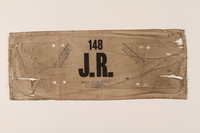Overview
- Description
- Collection of photographs and documents relating to Eric Zielenziger's prewar and wartime family history, including identification cards (real and false), papers from Westerbork, and police certificates.
- Credit Line
- United States Holocaust Memorial Museum Collection, Gift of Eric W. Zielenziger
Physical Details
- Extent
-
1 box
Rights & Restrictions
- Conditions on Access
- There are no known restrictions on access to this material.
- Conditions on Use
- Material(s) in this collection may be protected by copyright and/or related rights. You do not require further permission from the Museum to use this material. The user is solely responsible for making a determination as to if and how the material may be used.
Administrative Notes
- Holder of Originals
-
United States Holocaust Memorial Museum
- Legal Status
- Permanent Collection
- Provenance
- The papers were donated to the United States Holocaust Memorial Museum in 2005 by Eric Zielenziger.
- Record last modified:
- 2023-02-24 14:15:07
- This page:
- http://collections.ushmm.org/search/catalog/irn516909
Download & Licensing
- In Copyright - Use Permitted
- Terms of Use
- This record is not digitized and cannot be downloaded online.
In-Person Research
- Request 7 Days in Advance of Visit
- Plan a Research Visit
-
Request in Shapell Center Reading Room
Bowie, MD
Contact Us
Also in Eric W. Zielenziger family collection
The collection consists of an armband, documents and photographs relating to the experiences of Eric Zielenziger and his family in prewar Berlin, Germany, then as refugees in Paris, France, and Amsterdam, Netherlands, before and during World War II and in Amsterdam after the war.
Date: 1932-1946

Joodsche Raad armband worn by a German Jewish aide in a transit camp
Object
Joosche Raad (Jewish Council) stenciled white cloth armband worn by Eric Zielenziger, 22, while working in Westerbork transit camp in the Netherlands from December 1942 to March 1943. He worked on behalf of the emigration department of the Amsterdam Joodsche Raad and traveled between the city and the camp. In March, German authorities told Eric he could no longer travel between the two and Eric decided to stay in Amsterdam. In September 1943, Eric’s parents, Kurt and Lilly, were sent to Westerbork. That October, Eric went into hiding in the home of Frits and Jacoba Blom. The winter of 1944 was the Great Hunger. The Bloms had no food to spare so, in December 1944, Eric moved into hiding with family friends, Arthur and Grete Connor. On May 5, 1945, Amsterdam was liberated by Canadian forces. After the war, Eric learned that his father had died in Bergen-Belsen concentration camp in July 1944. His mother Lilly was liberated in April 1945 by the Soviet Army on the Lost Train en route to Theresienstadt, but died In May of typhus. In 1977, Jacoba and Frits Blom were recognized as Righteous Among the Nations by Yad Vashem.



